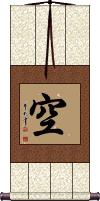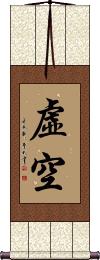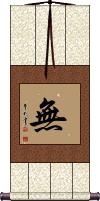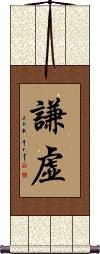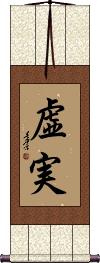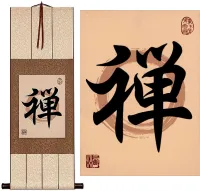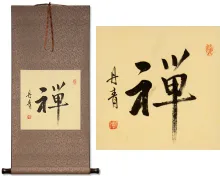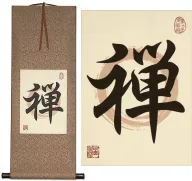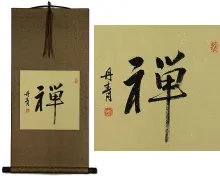Many custom options...
And formats...

Emptiness in Chinese / Japanese...
Buy an Emptiness calligraphy wall scroll here!
Personalize your custom “Emptiness” project by clicking the button next to your favorite “Emptiness” title below...
1. Sky / Ether / Void / Emptiness / Unreality
2. True Emptiness Yields Transcendent Existence
Sky / Ether / Void / Emptiness / Unreality
(Used in Japanese version of five elements)
空 is a single character that means empty, void, hollow, vacant, vacuum, blank, nonexistent, vacuity, voidness, emptiness, non-existence, immateriality, unreality, the false or illusory nature of all existence, and being unreal.
In the Buddhist context, this relates to the doctrine that all phenomena and the ego have no reality but are composed of a certain number of skandhas or elements, which disintegrate. The void, the sky, space. The universal, the absolute, complete abstraction without relativity. The doctrine further explains that all things are compounds, or unstable organisms, possessing no self-essence, i.e. are dependent, or caused, come into existence only to perish. The underlying reality, the principle of eternal relativity, or non-infinity, i.e. śūnya, permeates all phenomena making possible their evolution.
From Sanskrit and/or Pali, this is the translation to Chinese and Japanese of the title śūnya or śūnyatā.
In Japanese, when pronounced as “ron” (sounds like “roan”) this can be a given name. It should be noted that this Kanji has about 5 different possible pronunciations in Japanese: kuu, kara, sora, ron, and uro. 空 is also an element in the Japanese version of the five elements.
True Emptiness Yields Transcendent Existence
According to Soothill 眞空妙有 means:
The true void is the mysteriously existing, truly void, or immaterial, yet transcendentally existing.
眞空妙有 is the state of being nonexistent after removing all errant worldly influences. 眞空妙有 is achieved when all forms of existence are seen for their real nature.
Nothingness / Empty / Void
虛空 means empty space, empty sky, or void.
In the Buddhist context, it can mean “emptiness of the material world.” This can also be used as an adjective to modify other words with a meaning of unreal or insubstantial.
Nothing / Nothingness
無 is the simple way to express “nothing.”
However, this single character leaves a bit of mystery as to what you might really mean if you hang it as a wall scroll. I'm not saying that's a bad thing; as you can decide what it means to you, and you won't be wrong if you stay within the general context.
More info: 無 is usually used as a suffix or prefix for Chinese and Japanese words (also old Korean). It can be compared to “un-” or “-less” in English. It can also mean “not to have,” no, none, not, “to lack,” or nothingness.
Humble / Modesty / Humility
謙虚 is the most common way to say humble or modest in Japanese without a derogatory meaning (some other words suggest weakness, but this version holds a better humble meaning).
In Japanese, the first Kanji means self-effacing, humble oneself, and modesty. The second means void or emptiness.
See Also: Moderation
Five Elements
地水火風空 is the specifically-Japanese version of the five elements.
This is a little different than the ancient or original Chinese version.
The elements are written in this order:
1. Earth / Terra / Ground
2. Water
3. Fire
4. Wind / Air
5. Sky / Emptiness / Void / Ether
Note: This set of Kanji can also be romanized as “ji sui ka fuu kuu,” “jisuikafuukuu,” or “jisuikafuku.”
These can also be written in the order 地火風水空 (chi ka sui fuu kuu). Let me know when you place your order if you want the Kanji to be in this character order.
Kyojitsu: Falsehood and Truth
虚実 is a Japanese word that means “falsehood [and] truth” or “fiction [and] fact.”
This concept is used in warfare, gameplay, and martial arts strategies. 虚実 can be a strategy of real and/or deceptive moves. This gets to some Sun Tzu Art of War stuff where in warfare a strategic move is either a real and serious move or it is a deceptive blow.
Let's explore each character in more depth:
虚 was originally written 虛 (there is a very subtle difference in the strokes at the bottom of the character) and means unpreparedness, falsehood, emptiness, void, abstract theory, empty or unoccupied, diffident or timid, false, humble or modest, virtual, or in vain.
In the Buddhist context, 虛 represents the Pali/Sanskrit word “śūnya,” meaning empty, vacant, unreal, unsubstantial, untrue, space, humble, or in vain.
In ancient Eastern/Chinese astronomy, 虛 represents the “Emptiness” constellation (one of the 28 mansions in the sky).
実 was originally 實 in Chinese (they currently write it as 实 in Simplified Chinese) with the meaning, truth, reality, sincerity, honesty, fidelity, and substance.
The Buddhist context is similar, adding real, true, honest, really, solid, definitely, sincere, solid, fixed, full, to fill, fruit, kernel, verily, in fact, the supreme fact, or ultimate reality to the definition.
This in-stock artwork might be what you are looking for, and ships right away...
Gallery Price: $90.00
Your Price: $49.88
Not the results for emptiness that you were looking for?
Below are some entries from our dictionary that may match your emptiness search...
| Characters If shown, 2nd row is Simp. Chinese |
Pronunciation Romanization |
Simple Dictionary Definition |
空 see styles |
kòng kong4 k`ung kung kuu / ku くう |
More info & calligraphy: Sky / Ether / Void / Emptiness / Unreality(1) empty air; sky; (2) {Buddh} shunyata (the lack of an immutable intrinsic nature within any phenomenon); emptiness; (3) (abbreviation) (See 空軍) air force; (noun or adjectival noun) (4) fruitlessness; meaninglessness; (noun or adjectival noun) (5) (See 五大・1) void (one of the five elements); (can be adjective with の) (6) {math} empty (e.g. set); (female given name) Ron śūnya, empty, void, hollow, vacant, nonexistent. śūnyatā, 舜若多, vacuity, voidness, emptiness, non-existence, immateriality, perhaps spirituality, unreality, the false or illusory nature of all existence, the seeming 假 being unreal. The doctrine that all phenomena and the ego have no reality, but are composed of a certain number of skandhas or elements, which disintegrate. The void, the sky, space. The universal, the absolute, complete abstraction without relativity. There are classifications into 2, 3, 4, 6, 7, 11, 13, 16, and 18 categories. The doctrine is that all things are compounds, or unstable organisms, possessing no self-essence, i.e. are dependent, or caused, come into existence only to perish. The underlying reality, the principle of eternal relativity, or non-infinity, i.e. śūnya, permeates all phenomena making possible their evolution. From this doctrine the Yogācārya school developed the idea of the permanent reality, which is Essence of Mind, the unknowable noumenon behind all phenomena, the entity void of ideas and phenomena, neither matter nor mind, but the root of both. |
空無 空无 see styles |
kōng wú kong1 wu2 k`ung wu kung wu kūmu |
More info & calligraphy: Nothingness |
眞空妙有 see styles |
zhēn kōng miào yǒu zhen1 kong1 miao4 you3 chen k`ung miao yu chen kung miao yu shinkū myōu |
More info & calligraphy: True Emptiness Yields Transcendent Existence |
虚 see styles |
kyo きょ |
(1) unpreparedness; (2) falsehood; (3) {astron} (See 二十八宿,玄武・げんぶ・2) Chinese "Emptiness" constellation (one of the 28 mansions) |
虛 虚 see styles |
xū xu1 hsü kyo |
emptiness; void; abstract theory or guiding principles; empty or unoccupied; diffident or timid; false; humble or modest; (of health) weak; virtual; in vain śūnya. Empty, vacant; unreal, unsubstantial, untrue; space; humble; in vain. |
一空 see styles |
yī kōng yi1 kong1 i k`ung i kung ikkuu / ikku いっくう |
leaving none left; (sold etc) out (given name) Ikkuu All is empty, or of the void, non-material. |
三空 see styles |
sān kōng san1 kong1 san k`ung san kung sankū |
The three voids or immaterialities. The first set of three is (a) 空, (b) 無相, (c) 無願, v. 三三昧. The second, (a) 我空 , (b) 法空 , (c) 倶空 the self, things, all phenomena as "empty" or immaterial. The third relates to charity: (a) giver, (b) receiver, (c) gift, all are "empty". |
事空 see styles |
shì kōng shi4 kong1 shih k`ung shih kung jikū |
emptiness of discreet phenomena |
二空 see styles |
èr kōng er4 kong1 erh k`ung erh kung nikū |
The two voids, unrealities, or immaterialities; v. 空. There are several antitheses: (1) (a) 人空; 我空 The non-reality of the atman, the soul, the person; (6) 法空 the non-reality of things. (2) (a) 性空 The Tiantai division that nothing has a nature of its own; (b) 相空 therefore its form is unreal, i.e. forms are temporary names. (3) (a) 但空 Tiantai says the 藏 and 通 know only the 空; (b) 不但空 the 別 and 圓 have 空, 假, and 中 q.v. (4) (a) 如實空 The division of the 起信論 that the 眞如 is devoid of all impurity; (b) 如實不空 and full of all merit, or achievement. |
二鳥 二鸟 see styles |
èr niǎo er4 niao3 erh niao nichou / nicho にちょう |
(female given name) Nichō The drake and the hen of the mandarin duck who are always together, typifying various contrasted theories and ideas, e.g. permanence and impermanence, joy and sorrow, emptiness and non-emptiness, etc. |
五空 see styles |
wǔ kōng wu3 kong1 wu k`ung wu kung gokuu / goku ごくう |
(given name) Gokuu five kinds of emptiness |
人空 see styles |
rén kōng ren2 kong1 jen k`ung jen kung ningū |
Man is only a temporary combination formed by the five skandhas and the twelve nidānas, being the product of previous causes, and without a real self or permanent soul. Hīnayāna is said to end these causes and consequent reincarnation by discipline in subjection of the passions and entry into nirvana by the emptying of the self. Mahāyāna fills the "void" with the Absolute, declaring that when man has emptied himself of the ego he realizes his nature to be that of the absolute, bhūtatathatā; v. 二空. |
偏空 see styles |
piān kōng pian1 kong1 p`ien k`ung pien kung henkū |
imbalanced emptiness |
入空 see styles |
rù kōng ru4 kong1 ju k`ung ju kung nikkū |
enter emptiness |
內空 内空 see styles |
nèi kōng nei4 kong1 nei k`ung nei kung naikū |
Empty within, i. e. no soul or self within. |
內虛 内虚 see styles |
nèi xū nei4 xu1 nei hsü naiko |
inner emptiness |
前空 see styles |
qián kōng qian2 kong1 ch`ien k`ung chien kung maezora まえぞら |
(place-name) Maezora the prior emptiness |
十喩 see styles |
shí yù shi2 yu4 shih yü jūyu |
ten analogies [for emptiness] |
卽空 see styles |
jí kōng ji2 kong1 chi k`ung chi kung sokkū |
identical to emptiness |
取空 see styles |
qǔ kōng qu3 kong1 ch`ü k`ung chü kung shukū |
grasping to emptiness |
受空 see styles |
shòu kōng shou4 kong1 shou k`ung shou kung jukū |
emptiness of the recipient |
單空 单空 see styles |
dān kōng dan1 kong1 tan k`ung tan kung tan kū |
emptiness only |
因空 see styles |
yīn kōng yin1 kong1 yin k`ung yin kung inkū |
emptiness of cause |
外空 see styles |
wài kōng wai4 kong1 wai k`ung wai kung gekū |
emptiness of the external |
大空 see styles |
dà kōng da4 kong1 ta k`ung ta kung masataka まさたか |
wide open sky; the blue; heavens; firmament; (male given name) Masataka The great void, or the Mahāyāna parinirvāṇa, as being more complete and final than the nirvāṇa of Hīnayāna. It is used in the Shingon sect for the great immaterial or spiritual wisdom, with its esoteric symbols; its weapons, such as the vajra; its samādhis; its sacred circles, or maṇḍalas, etc. It is used also for space, in which there is neither east, west, north, nor south. |
太虛 太虚 see styles |
tài xū tai4 xu1 t`ai hsü tai hsü taiko |
great emptiness; the void; heaven; the skies; universe; cosmos; original essence of the cosmos great voidness |
妙空 see styles |
miào kōng miao4 kong1 miao k`ung miao kung myōkū |
excellent emptiness |
實空 实空 see styles |
shí kōng shi2 kong1 shih k`ung shih kung jikkū |
Absolute śūnya, or vacuity; all things being produced by cause and environment are unreal. |
愛空 爱空 see styles |
ài kōng ai4 kong1 ai k`ung ai kung megu めぐ |
(female given name) Megu loves emptiness |
我空 see styles |
wǒ kōng wo3 kong1 wo k`ung wo kung gakū |
生空 (衆生空); 人空 Illusion of the concept of the reality of the ego, man being composed of elements and disintegrated when these are dissolved. |
Click here for more emptiness results from our dictionary
The following table may be helpful for those studying Chinese or Japanese...
| Title | Characters | Romaji (Romanized Japanese) | Various forms of Romanized Chinese | |
| Sky Ether Void Emptiness Unreality | 空 | kuu / kara / sora / ron ku / kara / sora / ron | kōng / kong1 / kong | k`ung / kung |
| True Emptiness Yields Transcendent Existence | 眞空妙有 | shin kuu myou u shinkuumyouu shin ku myo u | zhēn kōng miào yǒu zhen1 kong1 miao4 you3 zhen kong miao you zhenkongmiaoyou | chen k`ung miao yu chenkungmiaoyu chen kung miao yu |
| Nothingness Empty Void | 虛空 虚空 | kokuu / koku | xū kōng / xu1 kong1 / xu kong / xukong | hsü k`ung / hsükung / hsü kung |
| Nothing Nothingness | 無 无 | mu | wú / wu2 / wu | |
| Humble Modesty Humility | 謙虚 | ken kyo / kenkyo | qiān xū / qian1 xu1 / qian xu / qianxu | ch`ien hsü / chienhsü / chien hsü |
| Five Elements | 地水火風空 地水火风空 | chi sui ka fuu kuu chisuikafuukuu chi sui ka fu ku | ||
| Kyojitsu: Falsehood and Truth | 虚実 | kyo jitsu / kyojitsu | ||
| In some entries above you will see that characters have different versions above and below a line. In these cases, the characters above the line are Traditional Chinese, while the ones below are Simplified Chinese. | ||||
Successful Chinese Character and Japanese Kanji calligraphy searches within the last few hours...
